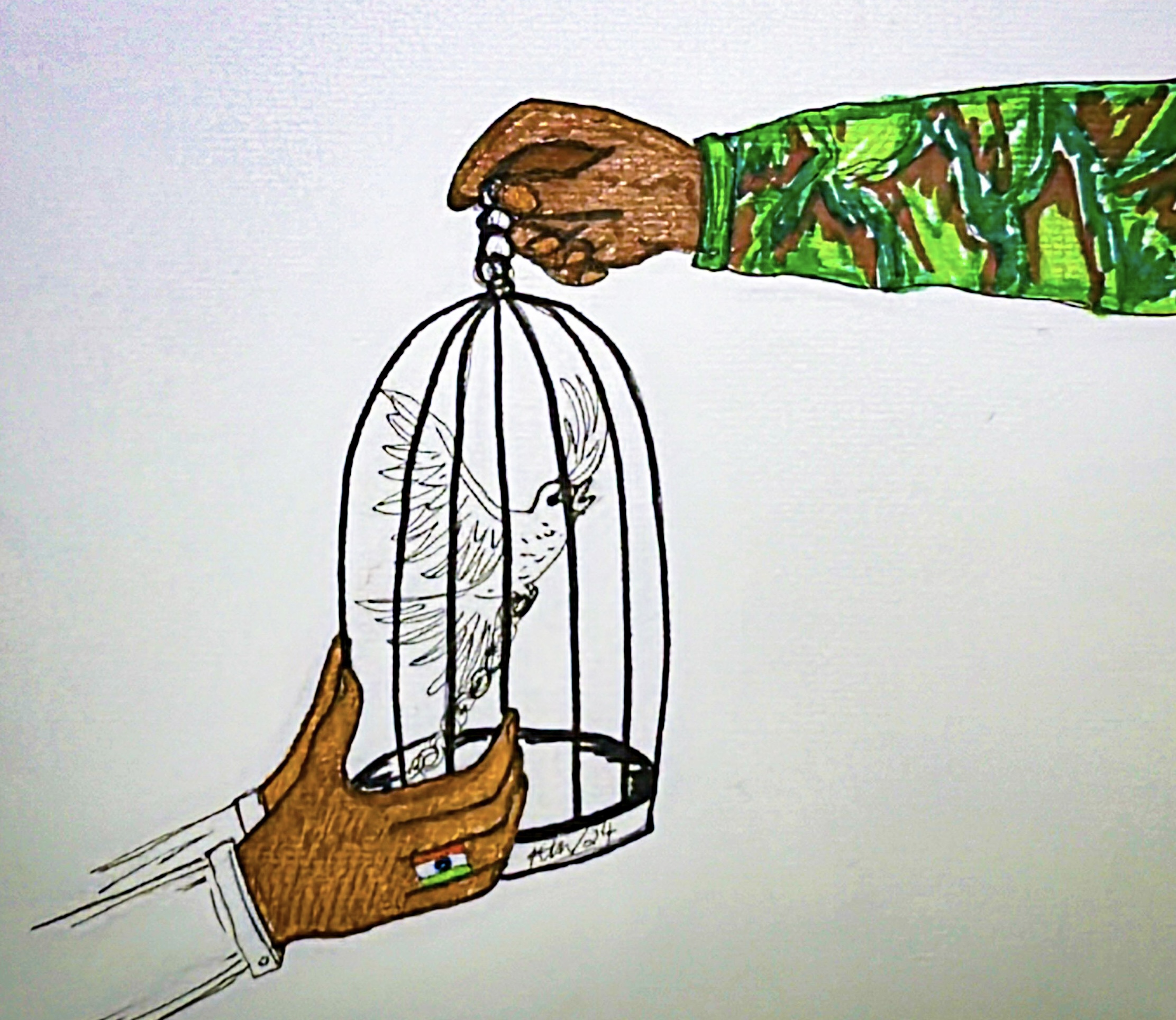
Illustration by Keera Ratnam / @wavesofcolour
Recent months have seen India rapidly expand its footprint in Sri Lanka. Under the presidency of Ranil Wickremesinghe, a series of deals have reportedly been agreed, binding the two economically closer than they have been in decades. From New Delhi, things may look comfortable across the Palk Strait. But it would be hasty to think so. If it is a long-term relationship with a stable partner that India is seeking, it will not be found in Colombo where authoritarianism is growing and Sinhala Buddhist nationalism continues to underpin the Sri Lankan state ethos. Instead, it is in liberating the Tamil North-East where India’s efforts should be focused.
Delhi may be pleased with the progress it has made in advancing its business interests so far. The Adani corporation has secured US backing to build a new container terminal in Colombo, alongside approval for the construction of wind power plants in the North-East. The State Bank of India opened more branches on the island, the National Thermal Power Corporation of India is to build a solar power plant in Trincomalee and India’s finance minister commissioned two tanks at the Lanka Indian Oil Company site last year. The running of three Sri Lankan airports and even the government’s stake in the island’s telecoms are also being eyed up by Delhi. Across a range of industries and areas, an Indian presence is being established.
Whilst these may seem like successes for India’s commercial interests, history has shown they should be treated with caution. There are no guarantees that this economic promise will come to fruition. Indeed, Sri Lanka has demonstrated time and again that despite committing to agreements, they can be delayed, ignored or even scrapped entirely. These are lessons that Delhi in particular will be sorely aware of. A free trade deal with India has been years in the making, and, amidst Sinhala protests, remains unsigned, despite a similar pact with Thailand being swiftly inked earlier this month. The Trincomalee tanker deal was initially agreed upon through the 1987 Indo-Lanka Accord but lay stagnant for decades. The Adani port deal is touted as a milestone but it is in constructing the West Container Terminal, not the development of the East Container Terminal that Delhi initially wanted, and had signed a deal on before Sri Lanka abruptly cancelled it. All the while China has already constructed, owns and runs a deep-water terminal, within the same complex.
With elections looming and Sinhala politicians vying to burnish their nationalist credentials, the recently agreed-upon deals will seem ever more tenuous, particularly as polls indicate the Wickremesinghe regime may not last into the next year. No doubt there are segments of the New Delhi establishment that recognise this, which is why even the Marxist JVP has been courted in recent weeks. But, as illustrated by the backlash that visit received, Sri Lanka’s anathema towards New Delhi is deep-rooted. According to the Mahavamsa-led ideology that has driven the island’s politics, India is viewed as an ancient invading menace, constantly threatening the Sinhala people and their Buddhist religion with its alien culture and demographic bulk. Business, political and cultural offerings are vehemently resisted to this day. Indeed, the central obstacle to Indian interests remains the Sinhala Buddhist majoritarian order. Until it works to challenge and contain this, it will not be able to realise any of its commercial or political objectives on the island.
As India seeks to grow its role as a regional and global power, it is in Tamil Eelam and its influential diaspora where its partners will be found. The millennia-long links with the North-East and potential in the region are self-evident, which is why many of Delhi’s projects are focused in the Tamil homeland. The focus on resuming flights and ferries from Jaffna and Mannar for instance, was widely hailed, despite opposition from Colombo. But the pledge of economic advancement and closer ties will not be fully realised whilst the North-East remains in the grip of the Sri Lankan state. Indeed, it is that same unabated Mahavamsa mindset which opposes Indian interests that ensures the region lags behind on several developmental markers and remains one of the most militarised places in the world.
Domestically too for Delhi, ensuring greater political freedoms for Tamil Eelam makes practical sense. It remains a key issue in Tamil Nadu, where fishermen continue to be arrested, assaulted and murdered by the Sri Lankan navy, and their kinfolk across the strait remain under occupation. By pushing Sri Lanka to demilitarise and meaningfully devolve power to the region, the stability and mutual prosperity that Delhi seeks will follow. The 13th Amendment, which India has paid lip service to for decades, will not be the vehicle that drives this. As Tamils themselves have made clear, it does not address any of the core political demands or minimal practical needs of the Tamil people. The proposed Provincial Council system is entirely toothless and leaves Colombo in complete control.
Liberating the North-East, economically and politically, will only take place once the shackles of the Sri Lankan state are broken. As political turbulence on the island continues and as history has shown, it would be in India’s interests to do so.
We need your support
Sri Lanka is one of the most dangerous places in the world to be a journalist. Tamil journalists are particularly at threat, with at least 41 media workers known to have been killed by the Sri Lankan state or its paramilitaries during and after the armed conflict.
Despite the risks, our team on the ground remain committed to providing detailed and accurate reporting of developments in the Tamil homeland, across the island and around the world, as well as providing expert analysis and insight from the Tamil point of view
We need your support in keeping our journalism going. Support our work today.
For more ways to donate visit https://donate.tamilguardian.com.

